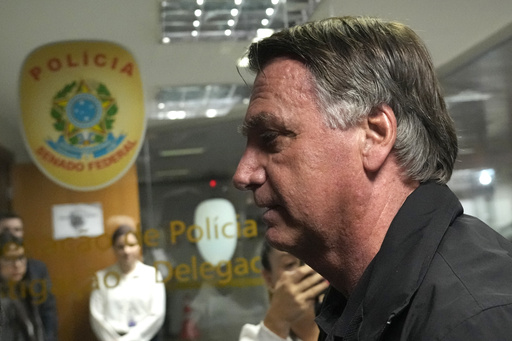
RIO DE JANEIRO — On Tuesday, Brazil’s attorney general officially accused former President Jair Bolsonaro of conspiring to execute a coup following his loss in the 2022 elections. This alleged plan involved schemes to poison his successor, current President Luiz Inácio Lula da Silva, as well as to assassinate a Supreme Court justice.
Attorney General Paulo Gonet contends that Bolsonaro, along with 33 co-conspirators, engaged in a plot to maintain their hold on power. According to Gonet’s 272-page indictment, this scheme purportedly included intent to poison Lula and assassinate Justice Alexandre de Moraes, known for his opposition to Bolsonaro. “The members of this criminal organization devised a strategy from the presidential palace to undermine institutions, aiming to topple the democratic order, which they ominously named ‘Green and Yellow Dagger,’” Gonet stated. “The plan was brought to the president’s attention, and he acquiesced.”
The colors yellow and green, often worn by Bolsonaro, have become emblematic of his political identity in Brazil.
In response to the charges, Bolsonaro’s legal team expressed their shock and indignation, asserting in a statement that the former president has never endorsed any efforts to dismantle democracy or the institutions supporting it. Additionally, Flávio Bolsonaro, Jair’s son and a senator, denounced the indictment as baseless on the social media platform X. He claimed there was a lack of evidence and accused the Prosecutor-General’s Office of advancing “the sinister interests of Lula.”
Last November, Brazil’s Federal Police presented a comprehensive 884-page report outlining the alleged conspiracy to Gonet. It claims a systematic initiative to undermine trust in the election process was orchestrated, including drafting a decree that would provide legal justification for their actions, coercing military leaders to endorse the plan, and inciting a riot in the nation’s capital.
In the indictment, Gonet outlined the alleged transgressions as a series of actions aimed at preventing Bolsonaro from relinquishing power, “in defiance of the popular will expressed at the polls.” The Supreme Court will review the charges, and if they are upheld, Bolsonaro could face trial.
The far-right leader maintains his innocence, stating, “I have no concerns about the accusations, zero,” in remarks to reporters during a visit to the Senate in Brasilia. “Have you seen the coup decree, by any chance? You haven’t. Neither have I,” he added.
Alongside allegations of instigating a coup, the 34 co-defendants face charges of involvement in an armed criminal organization and attempted violent overthrow of democratic governance, among others, as per a statement from the attorney general’s office. Gonet noted that the leadership of the alleged criminal organization included both Bolsonaro and his running mate, Gen. Braga Netto.
“These individuals encouraged and executed actions that are defined in our legal framework as threats to the existence and independence of the branches of power and the democratic order,” Gonet asserted.
The potential penalties vary with the severity of the crimes; a conviction for attempting a coup and for violently dismantling democratic governance could lead to a sentence of up to 20 years in prison under Brazilian law.
The indictment, characterized as “historic” by Luis Henrique Machado, a criminal attorney at IDP University in Brasilia, is expected to lead to a trial with the Supreme Court likely hearing the case before the end of 2024. “These charges demonstrate that Brazil’s institutions are strong, independent, and responsive,” Machado commented. “They can serve as a model for other countries facing democratic challenges.”
In light of these developments, Bolsonaro has been barred from participating in the 2026 elections after judges ruled he misused his authority and raised unsubstantiated doubts about the integrity of Brazil’s electronic voting system. Political science professor Carlos Melo from Insper University in Sao Paulo anticipates that Bolsonaro will position himself as a victim of political persecution, a strategy he has previously employed, claiming his legal challenges are designed to curb his political resurgence.
Polls suggest he could be competitive in the 2026 elections against Lula, with some surveys indicating as much as published earlier that day. “There will be political unrest, but it will eventually stabilize,” Melo predicted.

